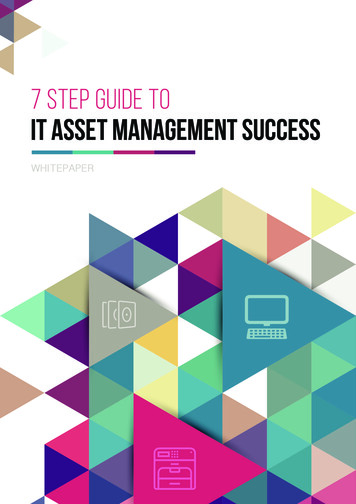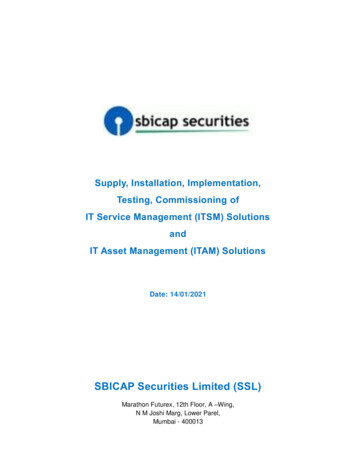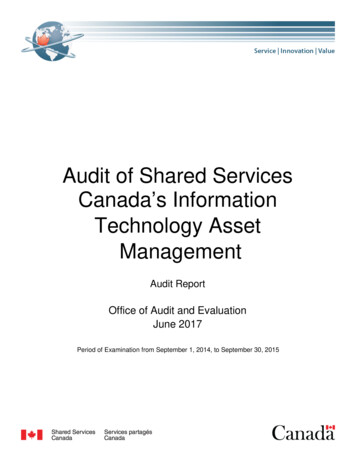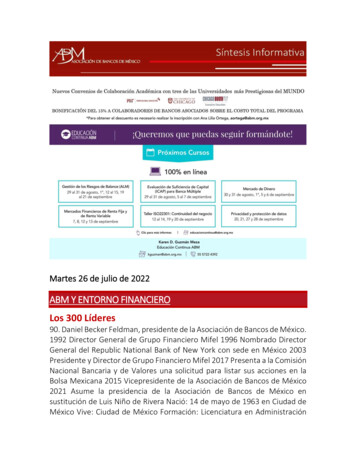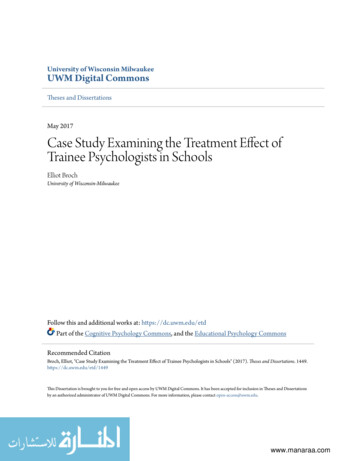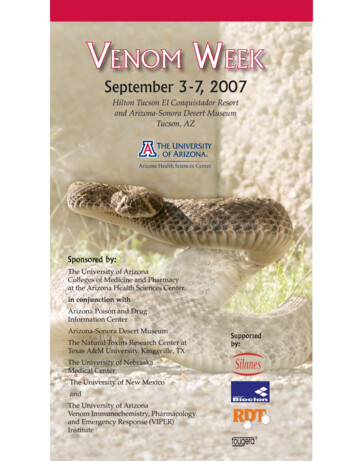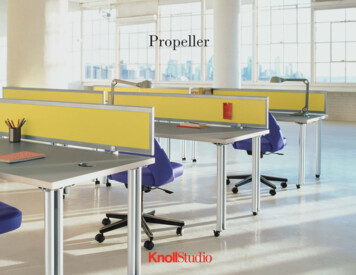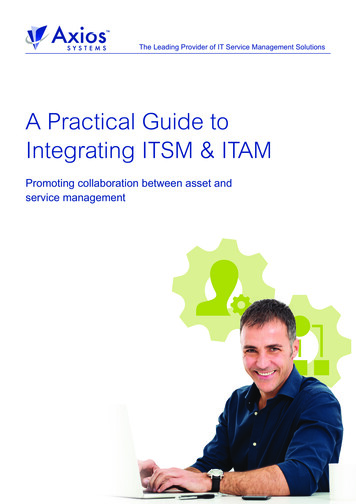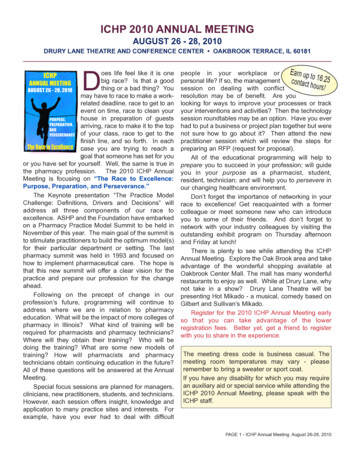
Transcription
ICHP 2010 ANNUAL MEETINGAUGUST 26 - 28, 2010DRURY LANE THEATRE AND CONFERENCE CENTER OAKBROOK TERRACE, IL 60181Does life feel like it is onebigrace? Is that a goodANNUAL MEETINGthingor a bad thing? YouAUGUST 26 - 28, 2010may have to race to make a workrelated deadline, race to get to anevent on time, race to clean yourhouse in preparation of guestsPURPOSE,PREPARATION,arriving, race to make it to the topANDPERSEVERANCE of your class, race to get to thefinish line, and so forth. In eachThe Race to Excellence case you are trying to reach agoal that someone has set for youor you have set for yourself. Well, the same is true inthe pharmacy profession. The 2010 ICHP AnnualMeeting is focusing on “The Race to Excellence:Purpose, Preparation, and Perseverance.”The Keynote presentation “The Practice ModelChallenge: Definitions, Drivers and Decisions” willaddress all three components of our race toexcellence. ASHP and the Foundation have embarkedon a Pharmacy Practice Model Summit to be held inNovember of this year. The main goal of the summit isto stimulate practitioners to build the optimum model(s)for their particular department or setting. The lastpharmacy summit was held in 1993 and focused onhow to implement pharmaceutical care. The hope isthat this new summit will offer a clear vision for thepractice and prepare our profession for the changeahead.Following on the precept of change in ourprofession’s future, programming will continue toaddress where we are in relation to pharmacyeducation. What will be the impact of more colleges ofpharmacy in Illinois? What kind of training will berequired for pharmacists and pharmacy technicians?Where will they obtain their training? Who will bedoing the training? What are some new models oftraining? How will pharmacists and pharmacytechnicians obtain continuing education in the future?All of these questions will be answered at the AnnualMeeting.Special focus sessions are planned for managers,clinicians, new practitioners, students, and technicians.However, each session offers insight, knowledge andapplication to many practice sites and interests. Forexample, have you ever had to deal with difficultICHPEarn uppeople in your workplace ortopersonal life? If so, the managementcontact h 16.25ours!session on dealing with conflictresolution may be of benefit. Are youlooking for ways to improve your processes or trackyour interventions and activities? Then the technologysession roundtables may be an option. Have you everhad to put a business or project plan together but werenot sure how to go about it? Then attend the newpractitioner session which will review the steps forpreparing an RFP (request for proposal).All of the educational programming will help toprepare you to succeed in your profession; will guideyou in your purpose as a pharmacist, student,resident, technician; and will help you to persevere inour changing healthcare environment.Don’t forget the importance of networking in yourrace to excellence! Get reacquainted with a formercolleague or meet someone new who can introduceyou to some of their friends. And don’t forget tonetwork with your industry colleagues by visiting theoutstanding exhibit program on Thursday afternoonand Friday at lunch!There is plenty to see while attending the ICHPAnnual Meeting. Explore the Oak Brook area and takeadvantage of the wonderful shopping available atOakbrook Center Mall. The mall has many wonderfulrestaurants to enjoy as well. While at Drury Lane, whynot take in a show? Drury Lane Theatre will bepresenting Hot Mikado - a musical, comedy based onGilbert and Sullivan’s Mikado.Register for the 2010 ICHP Annual Meeting earlyso that you can take advantage of the lowerregistration fees. Better yet, get a friend to registerwith you to share in the experience.The meeting dress code is business casual. Themeeting room temperatures may vary - pleaseremember to bring a sweater or sport coat.If you have any disability for which you may requirean auxiliary aid or special service while attending theICHP 2010 Annual Meeting, please speak with theICHP staff.PAGE 1 - ICHP Annual Meeting August 26-28, 2010
MEETINGLOCATIONThe ICHP 2010 Annual Meeting will be located at the Drury Lane Theatre and Conference Center, 100Drury Lane in Oakbrook Terrace, IL 60181. Drury Lane is conveniently located in Chicago's prestigiouswestern suburbs, just minutes from downtown and major airports. Please visit the website atwww.drurylaneoakbrook.com for transportation needs.HOTELRESERVATIONSAll meeting attendees are responsible for making their own hotel reservations. ICHP has specialdiscount room rates available at The Hilton Suites Chicago/Oakbrook Terrace, 10 Drury Lane,Oakbrook Terrace, IL 60181 (630-941-0100). The room rates are 89 single/double; 99 triple; 109quad per night. The cutoff date for the block hotel room reservations for the 2010 ICHP Annual Meetingis AUGUST 4, 2010. Reservation requests received after the cut-off date will be accepted on a spaceand rate availability basis. Remember to mention you are attending ICHP’s Annual Meeting.EXHIBITSHOWCASESCHEDULEIn order to give meeting attendees sufficient, quality time with the exhibit representatives, the ICHPAnnual Meeting Exhibit Showcase will be offered on both Thursday and Friday. The hours are:Thursday, August 26 from 2:30 PM to 4:30 PM and Friday, August 27 from 12:15 PM to 2:15 PM.(ICHP has limited the exhibit hall attendance to registered attendees only. Non-healthcareprofessionals may not attend the exhibit program.)EDUCATIONALPROGRAMMINGGOALSThe 2010 ICHP Annual Meeting educational programs are developed to maintain and enhance theknowledge, skills and abilities of pharmacists, pharmacy technicians and pharmacy students in healthcare systems through skill building and active participation in sessions on important issues relevant tocontemporary practice. The education goal of this meeting is to provide information and instruction ona variety of topics to enable pharmacy practitioners to provide quality patient care.Participants in the meeting will be able to:1. Review the existing and discuss future pharmacy practice models.2. Discuss factors shaping the training and continued education of pharmacists and pharmacytechnicians.3. Identify methods to improve communication among healthcare practitioners, colleagues,students and patients.4. Address current issues in clinical practice.5. Discuss key technology services used in pharmacy.CONTINUINGPHARMACYEDUCATIONCREDITAll education sessions will be offered for CPE credit and registrants may earn up to 16.25 contacthours at this meeting.ACCREDITATIONANDSTATEMENTS OFPARTICIPATIONCREDITThe Illinois Council of Health-System Pharmacists is accredited by the Accreditation Councilfor Pharmacy Education as a provider of continuing pharmacy education. Registrants at theIllinois Council of Health-System Pharmacists 2010 Annual Meeting may earn a maximum of12.25 ICHP (and 2.0 Massachusetts College of Pharmacy and Health Sciences; 2.0 ASHP)contact hours of continuing pharmacy education in states that recognize ACPE providers.At the present time, neither the Pharmacy Technician Certification Board (PTCB) nor the Illinois Boardof Pharmacy require technicians to participate in ‘T,’ or technician-specific continuing education forre-certification or relicensure purposes. Therefore, technicians are welcome to participate inprogramming that is either ‘P’ or ‘T’ and will receive CPE credit for either type, provided they meet allapplicable program requirements.In order to obtain CPE credit for each ICHP course attended, all attendees will need to access ICHP’sonline CPE system. Refer to your “Instructions for Completing Live Program Evaluations Online andDownloading Statements of Participation Credit” handout included in your meeting folder. Thursday’sLunch Symposium details can be found on page 5. Friday morning’s Track 2 Clinical Session details canbe found on page 6.Revised on June 18, 2010PAGE 2 - ICHP Annual Meeting August 26-28, 2010
Faculty ICHP 2010 Annual MeetingElizabeth Dodds Ashley, PharmD, MHS, BCPSInfectious Diseases Clinical PharmacistUniversity of Rochester Medical CenterRochester, NYMonika Gil, PharmDClinical Staff PharmacistRush University Medical CenterChicago, ILJoseph Bubalo, PharmD, BCPS, BCOPOncology Clinical Pharmacy Specialist,Clinical Operations ManagerAssistant Professor of Medicine, Division ofHematology and Medical OncologyOregon Health Sciences University Hospitalsand Clinics (OHSU)Portland, ORShellee Grim, PharmD, BCPSClinical Assistant ProfessorCollege of PharmacyClinical Assistant ProfessorCollege of Medicine, Infectious DiseaseUniversity of Illinois at ChicagoChicago, ILJill Burkiewicz, PharmD, BCPSProfessor, Pharmacy Practice;PGYI Residency DirectorMidwestern University Chicago College of PharmacyDowners Grove, ILLarisa Cavallari, BSc, PharmD, BCPS, FCCPAssociate ProfessorDepartment of Pharmacy PracticeUniversity of Illinois at Chicago College of PharmacyChicago, ILRick Couldry, RPh, MSDirector of PharmacyUniversity of Kansas Medical CenterKansas City, KSThomas File, Jr., MD, MSc, MACP, FIDSA, FCCPProfessor of Internal Medicine;Head ID SectionNortheastern Ohio Universities Colleges of Medicineand PharmacyRootstown, OhioChief, Infectious Disease ServiceSumma Health SystemAkron, OHNora Flint, PharmD, BCPS, FASHPAssociate Director, Clinical Services;Director, Pharmacy Practice ResidencyDepartment of PharmacyRush University Medical CenterChicago, ILMichael Fotis, BS PharmManager, Drug Information and Drug Use Policy;Residency DirectorNorthwestern Memorial HospitalChicago, ILRevised on June 18, 2010Justin Guthman, PharmDCommunity Pharmacy ResidentFroedtert HospitalMilwaukee, WICarol Heunisch, PharmDSenior Manager, Patient Care Services;Senior Pharmacy ManagerNorthShore University HealthSystem - Skokie HospitalSkokie, ILMeri Hix, PharmD, CGP, BCPSAssociate Professor of Pharmacy PracticeMidwestern University Chicago College of PharmacyDowners Grove, ILJames Hoffman, PharmD, MS, BCPSMedication Outcomes and Safety OfficerSt. Jude Children's Research HospitalMemphis, TNTravis Hunerdosse, PharmDClinical SpecialistDrug Use Policy/Formulary ManagementRush University Medical CenterChicago, ILJohn Ilic, PharmDManager, Pharmacy InformaticsLoyola University Medical CenterMaywood, ILHeath Jennings, PharmD, BCPSDirector of Pharmacy Acute Care Services,Investigational Drug Services, and GraduatePharmacy Education;Assistant ProfessorUniversity of Chicago Medical CenterChicago, ILcontinuedPAGE 3 - ICHP Annual Meeting August 26-28, 2010
Faculty ICHP 2010 Annual Meeting continuedJames Kalus, PharmD, BCPS (AQ CV)Senior Manager, Patient Care ServicesDepartment of Pharmacy ServicesHenry Ford HospitalDetroit, MIJames Lewis, PharmDInfectious Diseases Pharmacy Programs ManagerUniversity Health System Department of PharmacyClinical Assistant ProfessorUniversity of Texas Health Sciences CenterSan Antonio, TXAmy Lodolce, PharmD, BCPSAssistant Director of Drug InformationUniversity of Illinois at ChicagoCollege of PharmacyChicago, ILMichael McDaniel, RPh, MBA, FASHPDirector of Pharmacy ServicesHuntsville HospitalHuntsville, ALSara McEnaney, PharmD, MBAPGY2 Administrative ResidentFroedtert HospitalMilwaukee, WIMichael McEvoy, BS, PharmDPharmacy Purchasing CoordinatorNorthShore University HealthSystemEvanston, ILPamela Menas, PharmDClinical Oncology Pharmacy ResidentKellogg Cancer CenterEvanston HospitalNorthShore University HealthSystemEvanston, ILScott Meyers, RPh, MS, FASHPExecutive Vice PresidentIllinois Council of Health-System PharmacistsLoves Park, ILDavid Miller, RPhExecutive Vice PresidentInternational Academy of Compounding PharmacistsMissouri City, TXRevised on June 18, 2010Miriam Mobley-Smith, PharmDInterim DeanChicago State University College of PharmacyChicago, ILFrank Paloucek, PharmD, DABAT, FASHPDirector, Residency Programs;Clinical Associate Professor in Pharmacy Practice,Department of Pharmacy PracticeUniversity of Illinois at Chicago College of PharmacyChicago, ILGourang Patel, PharmD, MSc, BCPSClinical Pharmacy Specialist Critical CareRush University Medical CenterChicago, ILJennifer Phillips, PharmDAssistant Professor, Pharmacy PracticeMidwestern University Chicago College of PharmacyClinical Specialist, Drug InformationAdvocate Lutheran General HospitalKristi Stice, PharmD, BCPSPharmacy Clinical Development CoordinatorKishwaukee Community HospitalDeKalb, ILJoAnn Stubbings, RPh, MHCAClinical Assistant Professor, Pharmacy Practice;Manager, Research and Public Policy,Ambulatory Care PharmacyUniversity of Illinois at Chicago College of PharmacyChicago, ILTate Trujillo, PharmD, BCPS, FCCMDirector of Pharmacy;PGY1 Residency Program DirectorClarian Health PartnersMethodist HospitalIndianapolis, INPeter Vlasses, PharmD, DSc (Hon.), BCPS, FCCPExecutive DirectorAccreditation Council for Pharmacy EducationChicago, ILMark Woods, PharmD, BCPS, FASHPClinical Coordinator;Residency Program DirectorSaint Luke’s Hospital of Kansas CityKansas City, MOPAGE 4 - ICHP Annual Meeting August 26-28, 2010
ICHP 2010 ANNUAL MEETING SCHEDULE OF EVENTSTHURSDAY, AUGUST 26, 2010Drury Lane Conference Center Oakbrook Terrace, IL9:00 AM - 6:00 PMICHP Registration Desk HoursLocation: Drury Lane Conference Center Foyer10:00 AM - 1:20 PMLunch Symposium*Location: Crystal Room2.0 contact hours Type of Activity: ApplicationACPE Universal Activity Number:0026-9999-10-013-L01-PZero Tolerance for HAIs: Pharmacists TakeThe Next Step Towards Quality Improvementand Patient SafetyCo-sponsored by Massachusetts College of Pharmacyand Health Sciences (MCPHS) and Vemco MedEd(Attendees will hand in an evaluation form at the end of theprogram and the provider will mail out statements of creditwithin two weeks of the event.)* See pdf on ICHP’s Annual Meeting page for moreinformation. www.ichpnet.org11:30 AM - 1:00 PMPast President LunchLocation: English Room1:30 PM - 2:30 PMKeynote AddressThe Practice Model Challenge: Definitions, Driversand DecisionsLocation: Crystal Room1.0 contact hour Type of Activity: KnowledgeACPE Universal Activity Number:121-999-10-020-L04-P; 121-999-10-020-L04-T2:30 PM - 4:30 PMExhibitor ShowcaseLocation: Terrace and Venetian Rooms4:30 PM - 6:00 PMThe Future of Pharmacist EducationLocation: Oak and Brook Rooms1.5 contact hours Type of Activity: KnowledgeACPE Universal Activity Number:121-000-10-045-L04-P6:15 PM - 8:00 PMHouse of Delegates MeetingLocation: Crystal Room8:00 PM - 9:00 PM HOD Reception (Optional)FACULTY DISCLOSUREIt is the policy of the Illinois Council of Health-System Pharmacists (ICHP) to ensure balance, independence, objectivity,and scientific rigor in all of its education programs. In accordance with this policy, faculty must disclose to the participantsany significant relationships with commercial companies whose products or devices may be mentioned in facultypresentations, or with the commercial supporter of these continuing pharmacy education programs. These disclosures areincluded in the syllabus and will be announced during the program.Revised on June 18, 2010PAGE 5 - ICHP Annual Meeting August 26-28, 2010
ICHP 2010 ANNUAL MEETING SCHEDULE OF EVENTSFRIDAY, AUGUST 27, 2010Drury Lane Conference Center Oakbrook Terrace, IL7:00 AM - 5:30 PM ICHP Registration Desk HoursLocation: Drury Lane Conference Center Foyer7:00 AM - 8:00 AM Breakfast8:00 AM - 10:00 AMTrack 1: Technology SessionTechnology for Tomorrow PearlsLocation: Oak and Brook Rooms2.0 contact hours Type of Activity: KnowledgeACPE Universal Activity Number:121-000-10-046-L04-P; 121-000-10-046-L04-T8:00 AM - 10:00 AM Track 2: Clinical SessionLocation: Crystal Room12:15 PM - 2:15 PMExhibitor Showcase and LunchLocation: Terrace and Venetian Rooms2:15 PM - 5:30 PMTrack 1: Clinical SessionLocation: Oak and Brook Rooms2:15 PM - 3:15 PMRecent Literature: What Does it Meanfor Practice?1.0 contact hour Type of Activity: KnowledgeACPE Universal Activity Number:121-000-10-060-L01-P8:00 AM - 9:00 AMChronic Myelogenous Leukemia: Considerationsfor Selecting and Managing Therapy3:30 PM - 4:30 PMOptimizing Pharmacotherapy withPharmacogenomics1.0 contact hour Type of Activity: KnowledgeACPE Universal Activity Number:204-000-10-426-L01-P1.0 contact hour Type of Activity: KnowledgeACPE Universal Activity Number:121-000-10-050-L01-P9:00 AM - 10:00 AMThe Future Role of Biosimilars in Health Care4:30 PM - 5:30 PMPain Management in the Elderly1.0 contact hour Type of Activity: Knowledge10:00 AM - 10:15 AM Break10:15 AM - 12:15 PM General SessionLocation: Oak and Brook Rooms10:15 AM - 11:45 AMManaging Hyponatremia: Challenges andOpportunities for the Hospital Pharmacist1.5 contact hours Type of Activity: ApplicationACPE Universal Activity Number:121-999-10-047-L01-P1.0 contact hour Type of Activity: KnowledgeACPE Universal Activity Number:121-000-10-051-L01-P2:15 PM - 5:30 PM Track 2: Management SessionLocation: Crystal RoomSuccessful Team Building and Problem Solving:Managing Conflict, Controlling Individualism andAvoiding Dysfunction for the “Good of the Order”3.0 contact hours Type of Activity: ApplicationACPE Universal Activity Number:121-000-10-052-L04-P; 121-000-10-052-L04-T11:45 AM - 12:15 PMClinical Challenges in the Management ofHyponatremia3:15 PM - 3:30 PM Break0.5 contact hour Type of Activity: KnowledgeACPE Universal Activity Number:121-999-10-048-L01-P7:00 PM - 9:30 PM Presidents DinnerLocation: Maggiano’s Restaurant (Invitation only)Revised on June 18, 2010PAGE 6 - ICHP Annual Meeting August 26-28, 2010
ICHP 2010 ANNUAL MEETING SCHEDULE OF EVENTSSATURDAY, AUGUST 28, 2010Drury Lane Conference Center Oakbrook Terrace, IL7:30 AM - 3:30 PM ICHP Registration Desk HoursLocation: Drury Lane Conference Center Foyer6:30 AM - 9:00 AM Breakfast7:30 AM - 8:30 AM House of Delegates MeetingLocation: Venetian Room8:30 AM - 11:30 AMTrack 1: Technician SessionLocation: Crystal Room8:30 AM - 9:30 AMWhat’s on the Horizon for Pharmacy Technicians?1.0 contact hour Type of Activity: KnowledgeACPE Universal Activity Number:121-000-10-053-L04-P; 121-000-10-053-L04-T9:45 AM - 10:45 AMHigh Risk Drugs in the Hospital1.0 contact hour Type of Activity: KnowledgeACPE Universal Activity Number:121-000-10-054-L01-T10:45 AM - 11:30 AMDisposal of Pharmaceutical Waste: What aTechnician Should Know0.75 contact hour Type of Activity: KnowledgeACPE Universal Activity Number:121-000-10-055-L04-T8:30 AM - 11:30 AMTrack 2: Pharmacy Practice SessionLocation: Oak Room8:30 AM - 10:30 AMResidency Project Pearls1.75 contact hours Type of Activity: KnowledgeACPE Universal Activity Number:121-000-10-056-L01-P10:30 AM - 11:30 AMNontraditional Residencies: How YOU CanShape Pharmacy Practice1.0 contact hour Type of Activity: KnowledgeACPE Universal Activity Number:121-000-10-057-L04-PRevised on June 18, 20109:00 AM - 11:30 AMTrack 3: Student SessionLocation: Brook RoomThe Vibrant Shuffle on the Path to a Residency:Getting the Inside Look at the Process andPeople Involved9:30 AM - 9:45 AM Break11:30 AM - 1:00 PM Luncheon & Awards ProgramLocation: Venetian Room1:00 PM - 3:00 PMTrack 1: New Practitioners Special Interest SessionLocation: Brook Room1:00 PM - 2:00 PMTurn Your Bright Idea Into a Service Proposal1.0 contact hour Type of Activity: KnowledgeACPE Universal Activity Number:121-000-10-058-L04-P2:00 PM - 3:00 PMThe Nuts and Bolts of Mentoring:How to Be One, How to Find One1.0 contact hour Type of Activity: KnowledgeACPE Universal Activity Number:121-000-10-059-L04-P1:00 PM - 3:00 PMTrack 2: Pharmacy Practice SessionLocation: Oak Room1:00 PM - 2:00 PMRevitalize Your Rotation: A Collection of Toolsand Pearls for Teaching and Precepting1.0 contact hour Type of Activity: KnowledgeACPE Universal Activity Number:121-999-10-024-L04-P2:00 PM - 3:00 PMDrug Shortages are Plentiful1.0 contact hour Type of Activity: KnowledgeACPE Universal Activity Number:121-000-10-049-L04-P; 121-000-10-049-L04-T1:00 PM - 3:00 PM ICHP Residency ShowcaseLocation: Terrace RoomPAGE 7 - ICHP Annual Meeting August 26-28, 2010
ICHP 2010 ANNUAL MEETING PROGRAM OBJECTIVESZero Tolerance for HAIs: Pharmacists Take the Next StepTowards Quality Improvement and Patient SafetyUpon completion of this program, participants should be able to:1. Describe the prevalence and impact of bacterialresistance in HAIs.2. Evaluate antimicrobial dosing strategies that minimizeresistance development and achieve optimal outcomes.3. Recognize how hospital pharmacists can play an active rolein quality improvement and patient safety with respect to themanagement of patients with HAIs.The Practice Model Challenge: Definitions, Driversand DecisionsUpon completion of this program, participants should be able to:1. Define the attributes of current pharmacy practice models asdescribed in the most recent Survey of Hospital Servicespublished in the American Journal of Health-SystemPharmacy.2. Identify factors that are driving our critical re-examination ofpharmacy practice models.3. Choose at least one action item from those presented thatmay help participants facilitate positive change in the practicemodel employed in their organizations.Technology for Tomorrow PearlsUpon completion of this program, participants should be able to:1. Discuss the use of automation to process patient-specificorders, first-doses and cabinet replenishment.2. Describe how automation can contribute to patient safety.3. Outline a unique medication delivery system that isnursing-friendly and eliminates missed meds.4. Review how automation will enhance throughput and optimizeinventory control.Chronic Myelogenous Leukemia: Considerations forSelecting and Managing TherapyUpon completion of this program, participants should be able to:1. Describe the epidemiology, molecular biology, clinicalpresentation, and disease progression of CML.2. Describe the currently accepted standard treatments andresponse monitoring parameters for CML.3. Describe the role of second-generation tyrosine kinaseinhibitors (TKIs) in imatinib-resistant CML and emergingevidence related to their use.4. Identify options for preventing and managing toxicities,drug-drug interactions, and drug-food interactions related toTKIs.5. Identify areas of emerging research related to therapies forCML.Managing Hyponatremia: Challenges and Opportunities forthe Hospital PharmacistUpon completion of this program, participants should be able to:1. Describe the underlying pathophysiology, risk factors, and riskstratification of hospitalized patients with hyponatremia.2. Identify the mechanisms in which hyponatremia complicatesthe management of chronic medical conditions.3. Assess the pharmacists role and current treatment options forhyponatremia in the hospital setting.4. Examine the role of vasopressin receptor antagonists in themanagement of hyponatremia in the hospitalized patient.Revised on June 18, 2010Clinical Challenges and the Management of HyponatremiaUpon completion of this program, participants should be able to:1. Discuss the clinical management of a patient with syndromeof inappropriate antidiuretic hormone (SIADH) secretion.2. Review the management strategies for a patient with advanceliver disease who may be a candidate for liver transplantation.Recent Literature: What Does it Mean for Practice?Upon completion of this program, participants should be able to:1.Discuss the key findings of the papers presented.2. Identify strengths and weaknesses of the study design foreach paper reviewed.3. Explain the clinical implications of each paperOptimizing Pharmacotherapy with PharmacogenomicsUpon completion of this program, participants should be able to:1. Describe basic pharmacogenomic concepts.2. Identify genetic variations influencing pharmacokinetic andpharmacodynamic properties.3. Recognize examples of genetic information in drug labeling.4. Explain how pharmacogenomic principles affect drug therapydecisions.Pain Management in the ElderlyUpon completion of this program, participants should be able to:1. Discuss major updates in guidelines for pain management inthe elderly.2. Describe how to design and assess a therapeutic regimen forthe management of neuropathic pain.3. Review a pain management regimen with regard to efficacy,tolerability, and other potential drug-related problems in anelderly patient.Successful Team Building and Problem Solving: ManagingConflict, Controlling Individualism and AvoidingDysfunction for the “Good of the Order”Upon completion of this program, participants should be able to:1. Describe the characteristics of a shared value system.2. Explain how the concept of “self-deception” can influencepersonal and professional decision-making and relationships.3. Define the five dysfunctions of a team and how to avoid theirinfluence.4. Describe how managing “differences” and “self” can improvecommunications and team skills.5. Evaluate examples of successful vs. unsuccessful conflictresolution.6. Identify best practice paradigms for conflict resolution withinteaching and teamwork circumstances.7. Develop a personal roadmap to incorporate conflict resolutionconcepts and values into daily personal and professionalencounters.What's on the Horizon for Pharmacy Technicians?ASHP Technician InitiativeUpon completion of this program, participants should be able to:1. Describe the three goals of the initiative.2. Describe the purpose for the initiative.3. Discuss strategies for accomplishing these goals in Illinois.continuedPAGE 8 - ICHP Annual Meeting August 26-28, 2010
ICHP 2010 ANNUAL MEETING PROGRAM OBJECTIVES continuedHigh Risk Drugs in the HospitalTurn Your Bright Idea Into a Service ProposalUpon completion of this program, participants should be able to:1. Recognize high risk medications in the health-systempharmacy environment.2. Describe what makes a drug high risk.3. Discuss medical outcomes related to adverse drug events.4. Explain strategies to prevent or minimize medication errorsinvolving high risk medications.Upon completion of this program, participants should be able to:1. Describe how the service proposal is part of the overallplanning effort of a health care system.2. Explain how a service proposal can be used to justify apharmacy service.3. Perform a back-of-the-envelope analysis for a service.4. List the elements that are included in a service proposal.5. Evaluate examples of service proposals.Disposal of Pharmaceutical Waste: What a TechnicianShould KnowUpon completion of this program, participants should be able to:1. Identify at least three Federal and State agencies interestedin the proper disposal of outdated and unwantedpharmaceuticals.2. State the three categories of listed waste that pharmacies arelikely to generate.3. Distinguish the appropriate disposal containers (colors) forsharps, used items with trace contamination of chemotherapy,bulk disposal of hazardous pharmaceutical waste, dualwaste as well as suggested containers for non-hazardouspharmaceutical waste.Nontraditional Residencies: How YOU Can ShapePharmacy PracticeUpon completion of this program, participants should be able to:1. Describe the characteristics of alternative models forresidency programs, including non-traditional and "medicalmodel" structures and candidate selection.2. Identify the benefits and challenges of these modelscompared to traditional pharmacy residency programs,including increased numbers of residents and residentresponsibilities.3. Provide examples of emerging or alternative residencyprograms, including outcomes.Revitalize Your Rotation: A Collection of Tools and Pearlsfor Teaching and PreceptingUpon completion of this program, participants should be able to:1. Identify goals and activities that are essential to creating aresidency program that is enduring and has a legacy.2. Discuss tools and methods for selection of residentcandidates well suited to your program.3. Discuss the elements of precepting excellence.4. Identify at least 3 tactics for handling difficult preceptingsituations.5. Discuss statistics for the current demand and supply ofresidency positions.Drug Shortages are PlentifulUpon completion of this program, participants should be able to:1. Explain reasons for medication shortages.2. Outline strategies to manage medication shortages.3. Discuss financial implications of medication shortages on ahealth-system.4. Recognize potential safety issues resulting from medicationshortages.5. Describe methods to minimize medication errors as a result ofa medication shortage.ICHP 2010 Annual Meeting At-A-GlanceTHURSDAY, AUGUST 26, 2010SATURDAY, AUGUST 28, 20109:00 AM - 6:00 PM10:00 AM - 1:20 PM11:30 AM - 1:00 PM1:30 PM - 2:30 PM2:30 PM - 4:30 PM4:30 PM - 6:00 PM6:15 PM - 8:00 PM6:30 AM - 9:00 AM7:30 AM - 3:30 PM7:30 AM - 8:30 AM8:30 AM - 11:30 AM8:30 AM - 11:30 AM9:00 AM - 11:30 AM11:30 AM - 1:00 PM1:00 PM - 3:00 PMICHP Registration Desk HoursLunch Symposium*ICHP Past Presidents LunchKeynote Address*Exhibit ShowcaseGeneral Session*House of Delegates MeetingFRIDAY, AUGUST 27, 20107:00 AM - 5:30 PM7:00 AM - 8:00 AM8:00 AM - 10:00 AM8:00 AM - 10:00 AM10:15 AM - 12:15 PM12:15 PM - 2:15 PM2:15 PM - 5:30 PM2:15 PM - 5:30 PM7:00 PM - 9:30 PMICHP Registration Desk HoursBreakfastTechnology Session: Track 1*Clinical Session: Track 2*General Session*Exhibitor Showcase and LunchClinical Session: Track 1*Management Session: Track 2*President’s DinnerRevised on June 18, 20101:00 PM - 3:00 PM1:00 PM - 3:00 PMBreakfastICHP Registration Desk HoursHouse of Delegates MeetingTechnician Session: Track 1*Pharmacy Practice Session: Track 2*Student Session:Track 3*Lunch and Awards ProgramNew Practitioners SpecialInterest Session: Track 1*Pharmacy Practice Session: Track 2*ICHP Residency Showcase* See the 2010 Annual Meeting Schedule of Events onpages 5-7 of this brochure for details.PAGE 9 - ICHP Annual Meeting August 26-28, 2010
“The Race to Excellence:Purpose, Preparation,and Perseverance”ICHP 2010 ANNUAL MEETING REGISTRATION FORMAUGUST 26 - 28, 20
Kellogg Cancer Center Evanston Hospital NorthShore University HealthSystem Evanston, IL Scott Meyers, RPh, MS, FASHP Executive Vice President Illinois Council of Health-System Pharmacists Loves Park, IL David Miller, RPh Executive Vice President International Academy of Compounding Pharmacists
